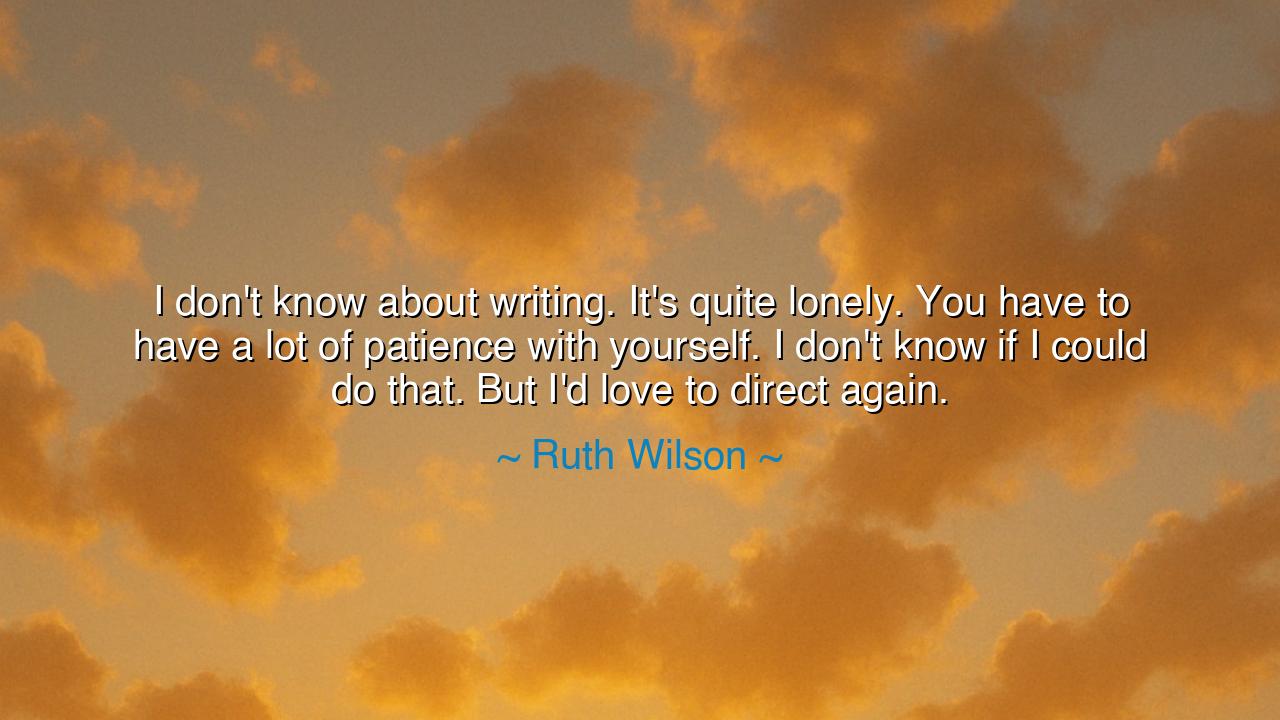
I don't know about writing. It's quite lonely. You have to have
I don't know about writing. It's quite lonely. You have to have a lot of patience with yourself. I don't know if I could do that. But I'd love to direct again.






Hear, O seekers of the creative path, the words of Ruth Wilson, who confessed with honesty: “I don’t know about writing. It’s quite lonely. You have to have a lot of patience with yourself. I don’t know if I could do that. But I’d love to direct again.” These words reveal the dual faces of creation: the solitary labor of the writer, and the communal craft of the director. In them is the recognition that every art demands its own spirit, and that not all souls are called to every form of work.
The origin of this truth lies in the nature of artistic creation itself. The writer sits alone, weaving worlds from silence, guided only by thought, memory, and imagination. It is a labor of solitude, demanding endless patience, for the writer must wrestle not with actors or cameras, but with their own heart. Hours may pass without a word worth keeping; days may end in frustration, with only doubt as company. To walk the writer’s path is to accept loneliness as a companion, and to trust that through it, a world may emerge from the void.
The director, by contrast, commands a living orchestra of voices, faces, and sounds. She does not labor alone but stands in the midst of a tribe—actors, crew, designers, and technicians—all gathered to bring vision into form. Directing is not less difficult, but it is different: it thrives on collaboration, on the sparks that leap when many people work together. Wilson, in her words, admits her nature leans toward this collective fire rather than the solitary struggle of the pen. And in this humility, there is wisdom: for not all are made to endure the same trials, and each must discover where their strength lies.
Consider, O listeners, the story of Sophocles. Though remembered as one of the great playwrights of Greece, he was also a general and a statesman. His plays, though born of his pen, lived fully only upon the stage, with chorus and actors bringing them to life before the people. Even in his time, the difference between writing and directing could be felt: one path of solitary composition, another of public collaboration. Both were needed for the drama to endure, and both required different temperaments.
Wilson’s words echo a deeper truth: creation is not only about talent, but about self-knowledge. Many fall into despair when they cannot master every art, but true wisdom is to know where your gifts burn brightest. The writer’s loneliness may not be for her, but in directing, she finds joy, purpose, and community. To recognize this is not weakness, but strength. It is the humility of knowing that one cannot be everything, but can still be great in the field where one belongs.
The lesson, then, is clear: do not force yourself into a mold that breaks your spirit. Know yourself, and be patient with your nature. If your strength lies in solitude, embrace it and write. If your fire thrives in collaboration, then direct, lead, or build among others. Do not compare paths as higher or lower, but honor each for what it requires. The world needs both the lonely writer who shapes worlds in silence and the bold director who orchestrates many into harmony.
Practical actions flow from this wisdom. Reflect on your own calling: does your heart grow in quiet labor or in collective creation? Do not despise one for the other, but find where you belong. When you work, grant yourself patience, for every path of art is filled with trial. And when you see others laboring in solitude, honor their sacrifice; when you see others leading a group, respect their burden. In this way, we celebrate the diversity of creation itself.
Thus do we honor the words of Ruth Wilson: that writing is a lonely path demanding patience, but that directing offers another kind of strength—the strength of leading others in shared vision. Carry this teaching, O children of tomorrow, into your own journeys. Choose your path with honesty, walk it with patience, and know that every calling, whether solitary or communal, adds light to the great story of humanity.






AAdministratorAdministrator
Welcome, honored guests. Please leave a comment, we will respond soon